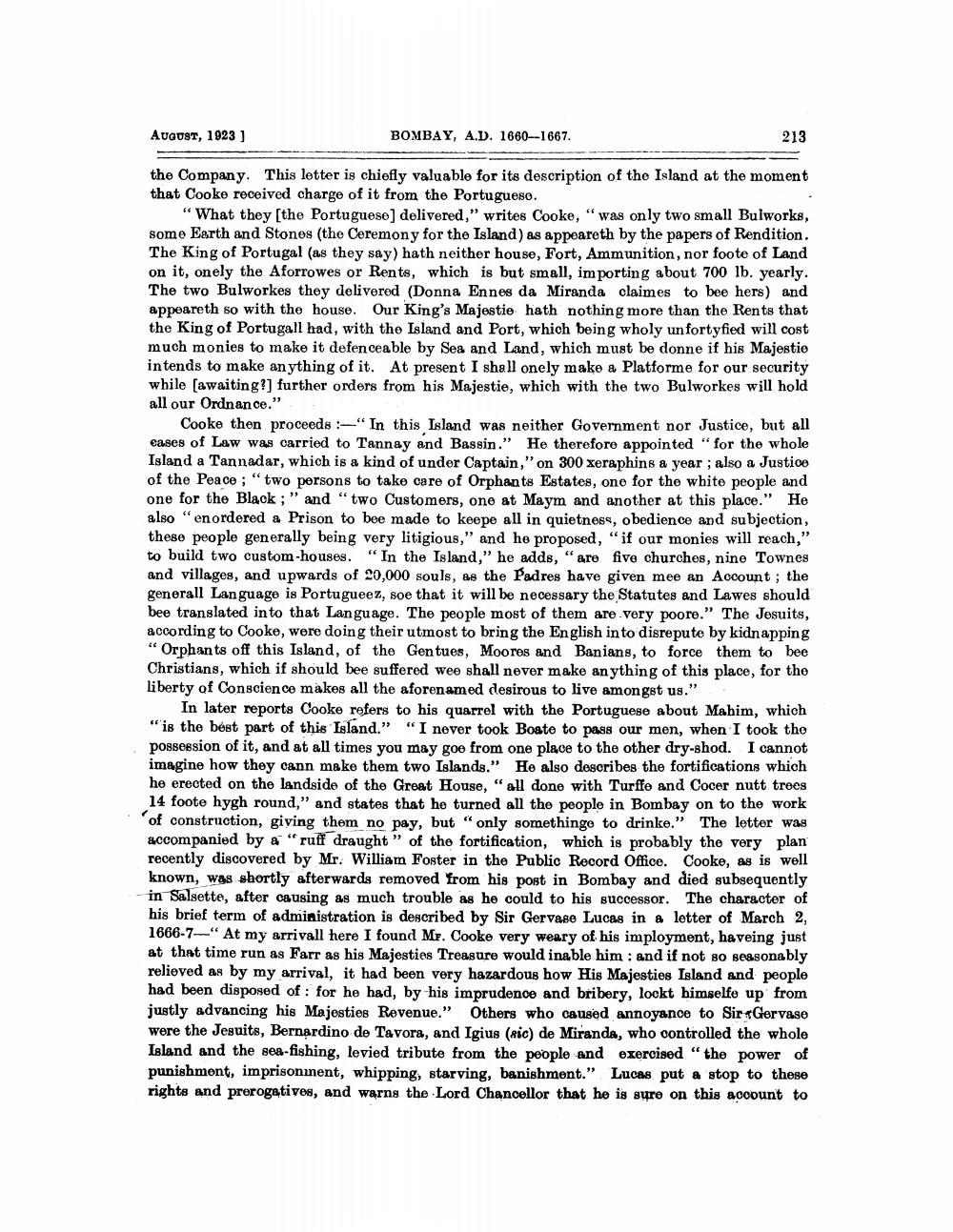________________
AUGUST, 1923)
BOMBAY, A.D. 1660--1667.
213
the Company. This letter is chiefly valuable for its description of the Island at the moment that Cooke received charge of it from the Portugueso.
“What they (the Portuguese) delivered," writes Cooke," was only two small Bulworks, some Earth and Stones (the Ceremony for the Island) as appeareth by the papers of Rendition. The King of Portugal (as they say) hath neither house, Fort, Ammunition, nor foote of Land on it, onely the Aforrowes or Rents, which is but small, importing about 700 lb. yearly. The two Bulworkes they delivered (Donna Ennes da Miranda olaimes to bee hers) and appeareth so with the house. Our King's Majestie hath nothing more than the Rents that the King of Portugall had, with the Island and Port, which being wholy unfortyfied will cost much monies to make it defenceable by Sea and Land, which must be donne if his Majestio intends to make anything of it. At present I shall onely make a Platforme for our security while awaiting!] further orders from his Majestie, which with the two Bulworkes will hold all our Ordnance."
Cooke then proceeds :-" In this Island was neither Government nor Justice, but all eases of Law was carried to Tannay and Bassin.” He therefore appointed "for the whole Island a Tannadar, which is a kind of under Captain," on 300 xeraphins a year ; also a Justice of the Peace ; "two persons to take care of Orphants Estates, one for the white people and one for the Black ; " and "two Customers, one at Maym and another at this place." He also “enordered a Prison to be made to keepe all in quietness, obedience and subjection, these people generally being very litigious," and he proposed, "if our monies will reach," to build two custom-houses. "In the Island," he adds, "are five churches, nine Townes and villages, and upwards of 20,000 souls, as the Padres have given mee an Account; the generall Language is Portugueez, soe that it will be necessary the Statutes and Lawes should bee translated in to that Language. The people most of them are very poore." The Jesuits, according to Cooke, were doing their utmost to bring the English into disrepute by kidnapping "Orphants off this Island, of the Gentues, Moores and Banians, to force them to bee Christians, which if should bee suffered wee shall never make anything of this place, for the liberty of Conscience makes all the aforenamed desirous to live amongst us."
In later reports Cooke refers to his quarrel with the Portuguese about Mahim, which "is the best part of this Island." "I never took Boate to pass our men, when I took the possession of it, and at all times you may goe from one place to the other dry-shod. I cannot imagine how they cann make them two Islands.” He also describes the fortifications which he erected on the landside of the Great House, “all done with Turffe and Cocer nutt trees 14 foote hygh round," and states that he turned all the people in Bombay on to the work of construction, giving them no pay, but “only somethinge to drinke." The letter was accompanied by a "ruff draught " of the fortification, which is probably the very plan recently discovered by Mr. William Foster in the Public Record Office. Cooke, as is well known, was shortly afterwards removed from his post in Bombay and died subsequently in Salsette, after causing as much trouble as he could to his successor. The character of his brief term of administration is described by Sir Gervase Lucas in a letter of March 2, 1666-7-"At my arrivall here I found Mr. Cooke very weary of his imployment, haveing just at that time run as Farr as his Majesties Treasure would inable him : and if not go seasonably relieved as by my arrival, it had been very hazardous how His Majesties Island and people had been disposed of: for he had, by his imprudence and bribery, lockt himselfe up from justly advancing his Majesties Revenue." Others who caused annoyance to Sir Gervase were the Jesuits, Bernardino de Tavora, and Igius (Ric) de Miranda, who controlled the whole Island and the sea fishing, levied tribute from the people and exercised “the power of punishment, imprisonment, whipping, starving, banishment." Lucas put a stop to these rights and prerogatives, and warns the Lord Chancellor that he is sure on this account to




